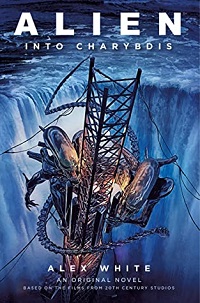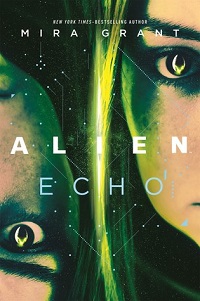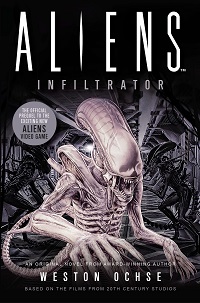Sponsored by Lovesickness: Junji Ito Story Collection.
In the horrifyingly beautiful feature story Lovesickness, Ryusuke returns to the town he once lived in only to find the same crossroads game he ran away from is increasing in popularity. Rumors begin to swirl about girls killing themselves after encountering a bewitchingly handsome man that coincidentally arrived in town at the same time. Harboring his own secret from time spent in this town, Ryusuke attempts to capture the beautiful boy and close the case, but what he finds is far more than he bargained for. This volume collects ten stories showcasing manga horror master Junji Ito in peak form.
Hey there horror fans, I’m Jessica Avery and I’ll be delivering your weekly brief of all that’s ghastly and grim in the world of Horror. Whether you’re looking for a backlist book that will give you the willies, a terrifying new release, or the latest in horror community news, you’ll find it here in The Fright Stuff.
Happy Alien Day, everybody! Who’s ready to get nerdy with me?
I’m sure it will surprise exactly none of you – especially since I went practically feral over Alex White’s Alien: Into Charybdis last month – but I am obsessed with the Alien franchise. It is my one true love, and a constant source of joy. You remember that meme going around that went “bitches be like this is my comfort movie” and then it would be a screen shot from some horror movie or some other equally unlikely film? Well I’m bitches and Alien is my comfort movie.
But as much as I love the Alien films, I love the Alien novels more! The Alien franchise would be a pale shadow of its detailed and expansive self were it not for its extensive novel canon and the cooperative efforts of many talented writers over the years. A book, particularly a lengthy book, will always do a better job of worldbuilding in detail than a film simply by virtue of having more leg room. That’s not meant to be a slam on film, or an absolute statement (there are some films that do incredible worldbuilding and some books that utterly fail at it). But when it comes to the Alien series, we really reap the benefits of so much additional content. Even novels like Scott Sigler’s Aliens: Phalanx or Mira Grant’s YA novel Alien: Echo, which standalone from the main storylines of the franchise, add color and explore the unlimited potential of this fictional universe.
It make sense that the Alien franchise would flourish as a series of books when its roots have always been literary. And though there are explicit references to mythology and literature in the series – for instance the various ships’ names; Nostromo and Sulaco from the novels of Joseph Conrad (a favorite of Ridley Scott’s, apparently), or the blatantly obvious Prometheus – it’s the larger scale themes of the franchise that truly speak to its literary heart.
One of the most present themes is, of course, the consequences of human greed – another tribute to Ridley’s fondness for Conrad, who often revisited the theme of the corruptive power of greed in his books. In the Alien films we are offered a front row seat to the unending grasping of the Weyland-Yutani corporation, the real and true evil in the Alien universe. But it’s in the companion novels to the film series that we see the real depth of The Company’s corruption and greed as they attempt to weaponize and monetize first the xenomorph and then, in the most recent generation of novels, the mysterious pathogen – plagiarus praepotens – with its horrific but immensely powerful mutagenic capabilities.
If you summed the heart of the Alien franchise up as “Capitalism Bad” you wouldn’t be far off your mark. But there are other themes in the franchise as well with obvious literary origins: the pursuit of the forbidden knowledge/science (in this case the act of creation), the responsibility of the creator to the created, and the betrayal of the creator by the created. These are massive, mythic themes, and I’m obsessed. There’s a direct line from the Prometheus myth to Milton’s Paradise Lost to Shelley’s Frankenstein clear to the Alien franchise, and I honestly think I could spend ages unpacking the way these themes intersect across mediums. Not to mention The Synthetic Question: that whole moral, ethical quandary – which Alex White has done amazing work with in their novels The Cold Forge and Into Charybdis, by the way – about what defines “a person” and what it means to create one.
You can pick up on these thematic intersections by watching the Alien films, of course. But the novels add so much depth and nuance to things that, on film, are the work of seconds. Since 2017 alone there have been 13 new Alien novels, and that’s not even taking into account the wealth of graphic novels which work in tandem with the novel canon to develop the ever expanding Alien universe. This franchise is thriving on the page!
That isn’t to say that we’ll never see the story carried forward in any other form of media, in fact most of you are probably aware that we are expecting a new video game this summer, Aliens: Fireteam, to which the newest novel in the franchise, Weston Ochse’s suspenseful Aliens: Infiltrator is actually the prequel! And somewhere out there in the aether lingers the sweet promise of a whole Alien series on Hulu…
But what we have seen, with Infiltrator and other recent novels, and what I hope we will continue to see with future novels, is that the map for the future of the Alien franchise is being developed on the page. Which is a brilliant set up, really! Prequels, sequels, interquels, and novelizations allow for multiple voices to have input in the franchise while also taking some of the burden of worldbuilding off of the more visual mediums. Can you play Fireteam without reading Infiltrator? Sure! But think of how much more depths the addition of 300+ pages of background and worldbuilding will give your playthrough!
Not that everything is picture perfect in Alien land. While we are awash in books to read, our pool of authors is almost bereft of diversity entirely. We desperately need authors of color, as well as more women and nonbinary authors. The Alien universe is vast and full of potential, and it will be a sad waste of that potential if efforts are not made to include new voices and perspectives to the mix. Still, the franchise is growing so I live in hope!
In the mean time, may I offer you a tasty sci-fi book by an author of color to add to your reading list along with your Alien picks? Pitch Dark by Courtney Alameda would be a perfect space horror fit for Alien fans! I also highly recommend checking out Toxic by Lydia Kang, which is a fabulous space horror novel about a living space ship and the one young woman left on board.
As always, you can catch me on Twitter at @JtheBookworm, where I try to keep up on all that’s new and frightening.



